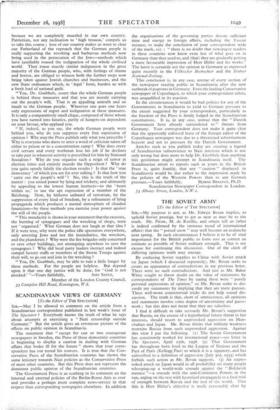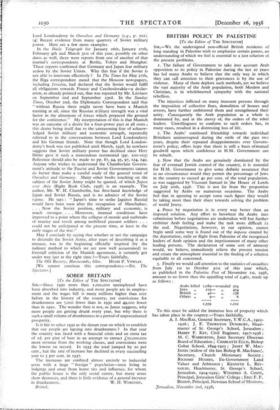THE SOVIET ARMY
[To the Editor of THE SPECTATOR] SIR,—My purpose is not, as Mr. Edwyn Bevan implies, to uphold Soviet prestige, but to get as near as may be to the truth. Mr. Pirow, M. de Kerillis, and others tell us (what is indeed confirmed by the ominous trend" of international affairs) that the "poised snow" may well become an avalanche next spring. In such circumstances I believe it to be of vital importance for the British public to form now as correct an estimate as possible of Soviet military strength. That is my excuse for continuing this discussion. Out of the clash of differing opinions truth may emerge.
By confusing Soviet supplies to China with Soviet attack on Japan (which I discussed separately), Mr. Bevan seeks to create an appearance of contradictions in my previous letter. There were no such contradictions. And just as Mr. Baker White sought to throw doubt on the value of statements by correspondents of The Times by saying these were "purely personal expressions of opinion," so Mr. Bevan seeks to dis- credit my statements by implying that they are mere guesses. These well-worn controversial tricks do not help sound dis- cussion. The truth is that, short of omniscience, all opinions and statements involve some degree of uncertainty and guess- work ; but this does not mean that they are valueless.
I find it difficult to take seriously Mr. Bevan's suggestion that Russia, on the excuse of a hypothetical future threat to her interests, should resort to unprovoked aggression on Man- chukuo and Japan. Mr. Bevan thinks that military weakness restrains Russia from such unprovoked aggression. Against this view I put the following. (I) The Soviet Government ...has consistently worked for international peace—see letter in The Spectator, April 15th, 1938. (2) That Government has throughout been loyal to the League of Nations and the Pact of Paris (Kellogg Pact) to which it is a signatory, and has subscribed to a definition of aggression (July 3rd, 1933) which forbids such action as Mr. Bevan suggests. (3) An unpro- voked attack on Japan would in all probability set many people whooping-up a world-wide crusade against the "Bolshevik menace "—a crusade with the anti-Comintern Powers in the van, urging on the rest with hysterical propaganda to a final trial of strength between Russia and the rest of the world. That this is Herr Hitler's objective is made reasonably clear by Lord Londonderry in Ourselves and Germany (e.g., p.
(4) Recent evidence from many quarters of Soviet military power. Here are a few more examples.
In the Daily Telegraph for January 26th, January 27th, February 9th and March 31st of this year, possibly on other dates as well, there were reports from one of another of that journal's correspondents at Berlin, Tokyo and Shanghai. These reports confirmed that Germany and Japan fear military action by the Soviet Union. Why this fear if the Soviet is not able to intervene effectively ? In The Times for May 27th, the Riga correspondent stated that the Moscow newspapers, including lzvestia, had declared that the Soviet would fulfil all obligations towards France and Czechoslovakia—a declar- ation, as already pointed out, that was repeated by Mr. Litvinov on September 2nd and September 23rd. In the Sunday Times, October 2nd, the Diplomatic Correspondent said that "without Russia there might never have been a Munich meeting at all, since the Russian military strength was a vital factor in the alinement of forces which prepared the ground for the conference." My interpretation of this is that Munich was an outcome of a desire for a four-power pact at all costs ; this desire being itself due to the unreasoning fear of acknow- ledged Soviet military and economic strength, repeatedly referred to in the conversations between Lord Londonderry and his German friends. Note that though Lord London- derry's book was not published until March, 1938, he nowhere suggests that Soviet military power has declined since Herr Hitler gave it such a tremendous testimonial (pp. 100-103) Reference should also be made to pp. 87, 94, 95, 97, 124, 149. Anyone who wishes to understand the Chamberlain Govern- ment's attitude to the Fascist and Soviet Governments cannot do better than make a careful study of the general trend of Ourselves and Germany. Many other books touching on the subject of the Soviet Army might be quoted, of which Japan over Asia (Right Book Club, 1938) is an example. The author, Mr. W. H. Chamberlin, has first-hand knowledge of Japan and Soviet Russia, and is no admirer of the Soviet regime. He says : "Japan's time to strike [against Russia] would have been soon after the occupation of Manchukuo. . . . Now the Soviet position, military and economic, is much stronger. . . . Moreover, internal conditions have improved to a point where the collapse of morale and outbreaks of mutiny and revolt among mobilised peasant soldiers . . . could not be anticipated at the present time, at least in the early stages of the war."
May I conclude by saying that whether or not the campaign to discredit the Soviet Army, after years of describing it as a menace, was in the beginning officially inspired (by the indirect method to which we are now well accustomed) to forestall criticism of the Munich agreement, it certainly got under way just at the right time ?—Yours faithfully,
The Old Rectory, Harescombe, Glos. HUGH P. VOWLES. [We cannot continue this correspondence.—En. The Spectator.]















































 Previous page
Previous page